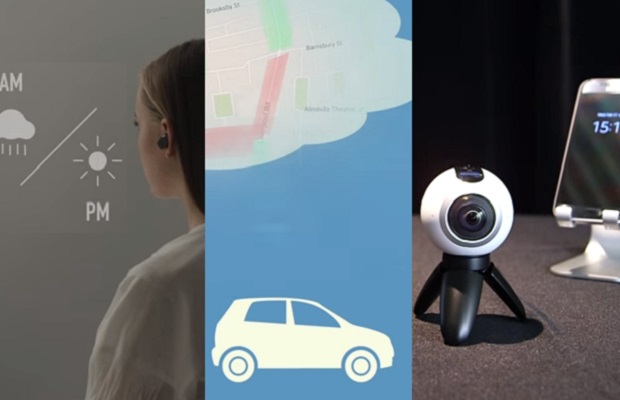With Mobile World Congress in full swing, we look at five of the biggest future shocks to emerge from the trade show.
Sony puts AI in your ear
In a move reminiscent of the film ‘Her’, Sony was showing off an earpiece that puts a virtual assistant in its owner’s ears. The Xperia Ear is part of Sony’s plans to extend its mobile brand beyond tablets and phones. The device features a proximity sensor that informs a wirelessly linked Android smartphone when it is in the user’s ear. An app on the phone then provides location and time-based prompts about the weather, diary appointments, social media posts, missed calls and the news. It can also respond to voice commands for internet searches, navigation directions and message dictations. Its battery life is limited to three-and-a-half hours of active use, but Sony suggests this will be enough for most people most days.
Samsung aims to make everyone a VR creator
Alongside its latest S7 phone, Samsung showcased its Gear 360 Camera . The VR cam can capture information on its 128GB microSD and sync with your PC for stitching and editing. The Galaxy S7 can also shrink the video down to a more share-friendly size and act as the camera’s remote. The Gear 360’s dual, 195-degree fisheye lenses capture 30 megapixel still images up to 3840 x 1920 resolution, which would be a higher-than-average resolution than other cams out there. Two microphones also mean the Gear 360 can record audio in stereo.
Smart Ford cars dodge traffic jams (and find parking spaces)
Ford ramped up its driverless and connected car technology building out its GoDrive pay-by-the-minute car hire and sharing service being trialled in London with a variant called GoPark.
GoPark is a predictive parking system that can direct customers to a place where they’re most likely to find a parking space. Meanwhile, Ford’s Traffic Jam automatically helps a driver with steering, braking and acceleration in heavily congested traffic on motorways, and Active Park Assist, which helps drivers pull into a parking spot at the touch of a button. A FordPass customer experience platform will debut in Europe this year, along with Sync 3, an infotainment system that supports Android Auto and Apple CarPlay and receives over-the-air-updates courtesy of Microsoft’s Azure cloud platform. FordPass acts as a hub for a range of connected car services, such as remote locking, car sharing, vehicle location, guides and a services marketplace.
LG’s first modular phone
LG’s new G5 has an always-on display that never sleeps, letting you see the time, date, and notifications at a glance. The most novel feature, however, was the phone’s “magic slot”, which accommodates extra accessories to be added onto the phone. LG has essentially made its first modular phone.
HTC finally reveals $800 Vive
More expensive than the Oculus Rift, HTC finally revealed its contentder for the virtual reality crown. The price tag includes the headset, room sensors, controllers, and two bundled games. It will be available for pre-order starting February 29, with shipping to start April 1.
